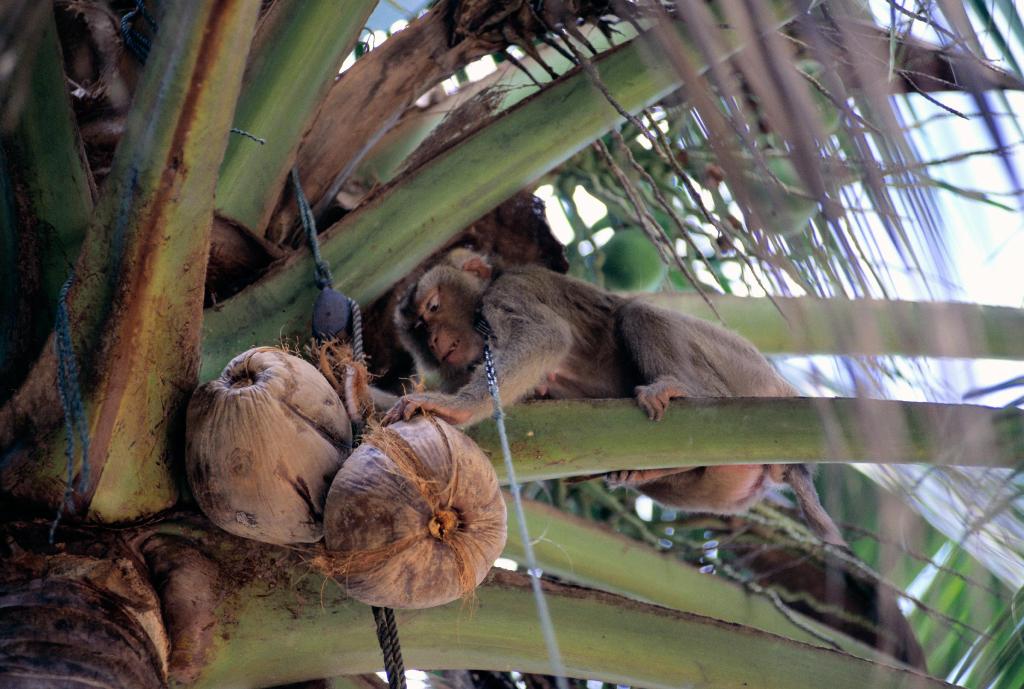News Video
Monkeys to Blame for Thailand’s Struggling Coconut Industry

Thai exporters of coconut milk say they are being spurned by prospective buyers in the E.U. and U.S.because monkeys are used to gather the coconuts. Thailand has been training monkeys to pick coconuts for around 400 years.
However buyers in the west now see the use of monkeys to harvest coconuts as animal abuse.
Industry representatives have tried to explain to their trade partners in the West that sending monkeys up the tree to get the coconuts is part of their culture.
The growers are pleading with the Department of Agriculture to press the point with the foreign buyers. Saying tradition, culture, no harm done, and amusing for Western tourists to watch.
Thai government has stayed silent
The more desperate plantation owners have shrugged and sacked the monkeys, turning instead to human labour. However the decline in coconut exports remains a threat to many growers.
If you’ve consumed coconut oil or used coconut milk, there’s a reasonable chance it was imported from Thailand. And if it was, there’s an even better chance the farmer had a monkey fetch it from a coconut tree.
Thailand has been raising and training macaques to pick coconuts for around 400 years. Coconut farmers in other ASEAN countries also rely on monkeys to harvest coconuts.
Why monkeys? Turns out a monkey can collect an average of 1,600 coconuts per day. While a human can only collect around 80 per day. It’s also safer for monkey to pluck and drop the fruit from the trees. Coconut trees are up to 80 feet tall and hard for a human to climb.
Monkeys are key to the Asian coconut industry — until Animal Place, a farm sanctuary in Grass Valley, Calif., claimed that monkeys are being “exploited” on coconut plantations. “Animal-aware people are increasingly avoiding coconut products that come from monkey slavery,” the group, which advocates a vegan diet, said.
While Animal Place says it has not actually visited any coconut plantations allegedly abusing monkeys. Marji Beach, the group’s Social Justice Warrior, says that YouTube videos are evidence enough that the monkeys are cruelly shackled. Even more they are forced to work, “Monkeys should stay in the wild,” Beach says.
Monkey trainers in Thailand find that hard to believe
“It would be difficult to find a coconut product made in Thailand that wasn’t picked by a monkey,” Arjen Schroevers tells Monkeys pick 99 percent of the Thai coconuts sold for their oil and flesh, he tells NPR.
Schroevers runs the Monkey Training School in Surat Thani, Thailand. A Buddhist-inspired school founded 50 years ago to teach monkeys how to pick coconuts. Without the use of force or violence. He says Animal Place has it all wrong when it comes to how monkeys work on coconut farms are treated.
“It is always relaxed, no shouting, no punishing,” he says. “Every few trees the monkey hugs his owner, who then checks the monkey for red ants (who live in the trees) and the monkey gets a massage. Outside working hours the monkeys are kept as pets.”
And as for the tethering, Schroevers says it serves a variety of purposes including guiding the monkeys up the tree and preventing them from escaping.
What’s more, says Schroevers, the alternative would be a human poking a long pole with a knife up into the tree to cut the coconuts. “Because the trees are so high, you must stand straight under the coconuts you want to collect,” he says. “They drop 6-12 at a time. “That’s Very Dangerous!” He adds that coconuts kill around 600 people per year worldwide.
A monkey tether is like a dog leash
Of course, the working monkeys in Thailand have many similarly industrious counterparts in the animal world. Think oxen plowing fields; sheepdogs herding livestock; rottweilers guarding houses or beagles sniffing for drugs in airports. Dogs are tethered on a leash, oxen are tethered to plows, is this also animal abuse?
Others familiar with the coconut-picking monkeys of Thailand are also skeptical of the allegations of abuse. Leslie Sponsel, a professor emeritus of anthropology at the University of Hawaii who, with his wife, Dr. Poranee Natadecha-Sponsel, studied monkey-human relationships in Thailand and published papers on the topic.
“During our time in southern Thailand, we never observed or heard of cruelty or abuse of the monkeys,” Sponsel says. “Indeed, the monkeys are very similar to family pets. Also for some households, monkeys were even like family members to some degree. Young ones are trained, and they are kept on a tether to the handler. The monkeys are fed, watered, bathed, groomed and otherwise cared for.
They often ride to the coconut palm plantation on the back of a motor bike or in a cart driven by the handler.
“That is not to say that there is never any cruelty or mistreatment,” Sponsel adds. But overall, he says he respects “the poor farmers and others who are just trying to survive and prosper in support of their families.”
Source: NPR, The Nation































